Cocoa prices are rising, there are concerns about India's electoral bonds, and a typo caused Lyft shares to surge.

The video is playing in picture-in-picture mode, and various programs are currently airing on Fox Business Channel, Fox News Channel, and Fox News Radio.

Tajikistan's state-owned power company, Barki Tojik, plans to increase electricity exports to Afghanistan by 17% despite ongoing shortages at home and domestic rationing, as they view the Taliban-run regime in Kabul as a reliable payer for electricity.

Despite recent pockets of market stress caused by interest rates, overall financial markets have remained resilient due to the artificial intelligence boom and a strong US economy, with risk appetite high and financial conditions easing to pre-inflation-fighting levels.

Despite the concerns about Joe Biden's handling of the economy and low sentiment scores, there has been a recent increase in sentiment, with the University of Michigan's survey showing a 30% rise since November, signaling a positive trend for the President as the economy continues to improve.

High-yield savings accounts that offer interest rates higher than inflation rates can be a smart strategy for protecting and growing your savings in today's inflationary environment.
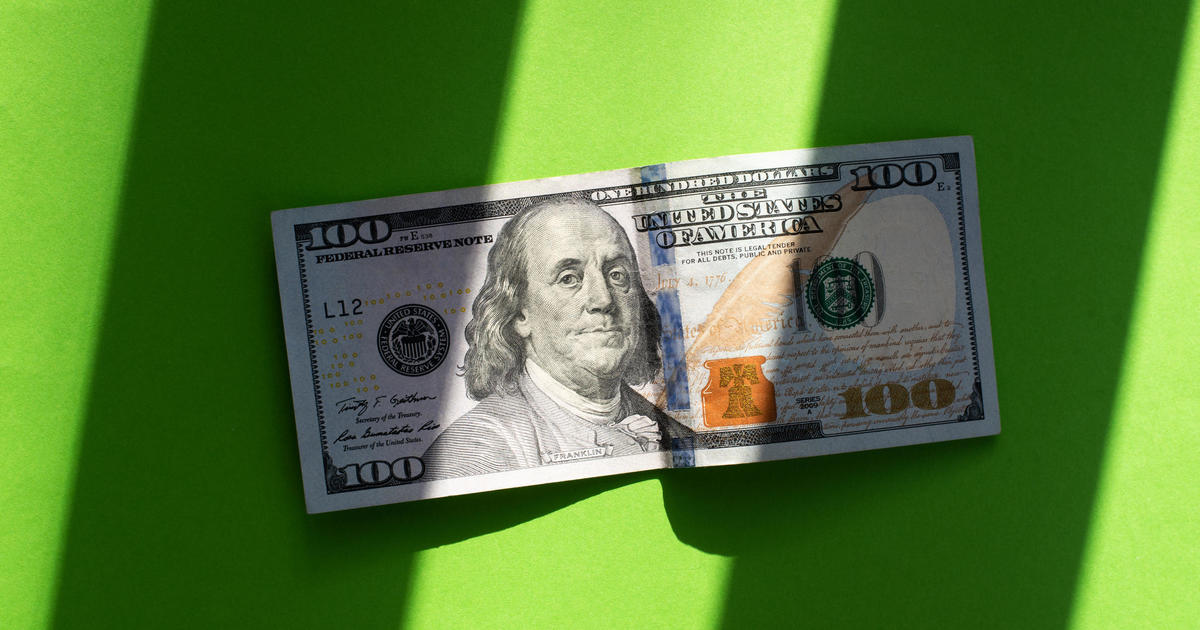
Mortgage rates reached a two-month high after producer and consumer prices exceeded expectations in January, reducing the likelihood of Federal Reserve interest rate cuts in the near future.

The Federal Reserve's focus on "supercore inflation," which excludes housing from core inflation, may delay rate cuts if the trend of high inflation continues, according to economists.

Despite current high mortgage rates and the possibility of a rate cut being delayed, homebuyers can still reduce their mortgage rate by purchasing mortgage points, which can lower the rate by half a percentage point or more.

Federal Reserve officials, including Mary Daly and Raphael Bostic, emphasize the need for more time and data before cutting interest rates, citing the current state of inflation and the resiliency of the economy. Additionally, banking supervisors are closely monitoring commercial real estate risks, and consumer sentiment improves slightly while inflation worries persist. Furthermore, new housing starts in January were lower than expected, and wholesale prices experienced a slight increase in January.
:max_bytes(150000):strip_icc()/GettyImages-1463305344-f893818952dc40d4958e9660a7a71efa.jpg)
Former Treasury Secretary Larry Summers suggests that a wave of inflationary signals increases the likelihood of the Federal Reserve raising interest rates rather than lowering them, emphasizing the need for caution given the current economic situation.
Consumer sentiment in the United States increased slightly in February, signaling that Americans are starting to feel more optimistic about the economy, although it remains below its long-run average due to rising inflation. The improved sentiment could have implications for the upcoming presidential race, which is expected to focus on President Joe Biden's economic performance.

President Biden's hope for a decrease in inflation to boost his approval rating and increase his chances of re-election in November may be hindered as prices for staples like rent, food, and transportation remain high, and recent data suggests that inflation is not receding as quickly as expected.

The price of cement in Nigeria continues to rise, with increases of up to 30% as manufacturers raise their prices and distributors implement fresh increases, prompting the Minister of Housing and Urban Development to plan a meeting with cement manufacturers to address the issue.
New Zealand's poorest people will likely bear the burden of the country's fight against inflation, as highlighted in the Salvation Army's latest State of the Nation report, with a rise in children in households receiving benefits and an increase in food insecurity.

US housing starts recorded their largest decline since April 2020 in January, falling by 14.8% due to inclement winter weather, which affected construction activity in the Northeast and led to a slowdown in multifamily projects. However, experts anticipate a rebound in single-family starts this year, supported by strong demand and attractive incentives offered by builders.
While inflation rates are not dropping as fast as desired in the US, it presents an opportunity for individuals aiming to increase their savings by considering opening a certificate of deposit, according to Dan Geltrude, founder of Geltrude and Co.

China's population is projected to decline by 60% by the end of the century, posing challenges to the economy's growth due to an ageing population and low birth rates.
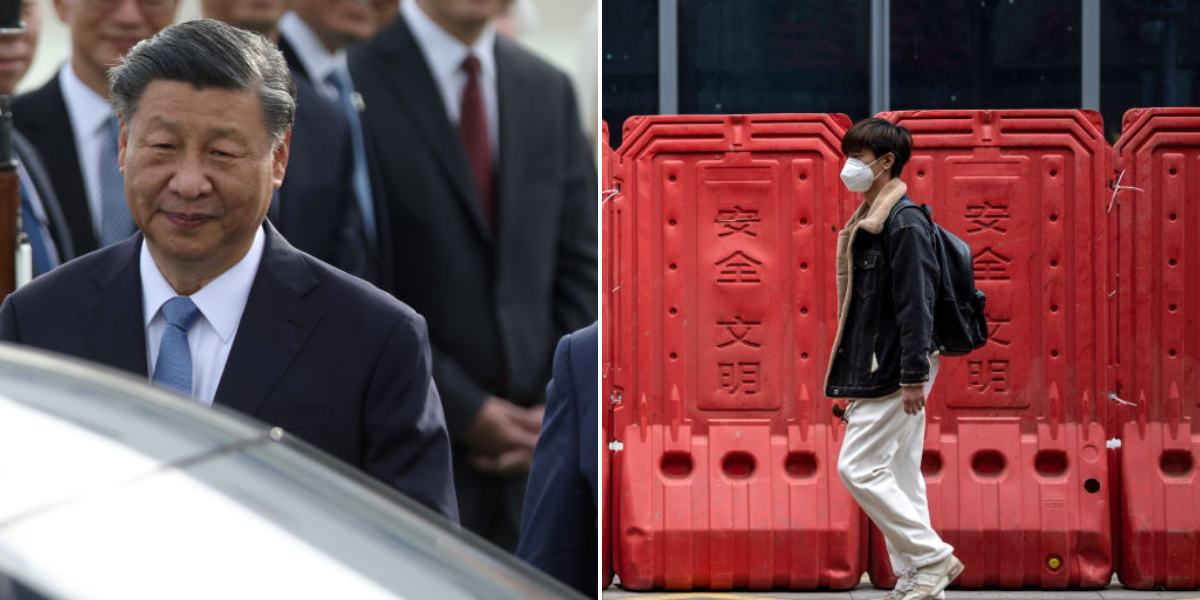
US mortgage rates have reached their highest level in over two months, with the average rate on a 30-year fixed home loan at 6.77%. This means that homebuyers are now paying an extra $700 per month compared to two years ago, and uncertainty over when the Federal Reserve will cut interest rates is causing further instability in the housing market.

The Bureau of Labor Statistics reports that productivity in the US increased by 2.7% in 2023, more than double the rate from 2005 to 2019.

Treasury yields reached their highest levels of the year after wholesale price inflation exceeded expectations, leading to reduced investor expectations for interest rate cuts by the Federal Reserve.

Consumer sentiment in the US has slightly increased to 79.6 in February, missing expectations, with inflation expectations also rising, according to the University of Michigan's monthly survey.
U.S. stocks are held back by a higher-than-expected inflation report, with the S&P 500 down 0.3% and the Dow Jones Industrial Average down 0.2%, following an increase in prices in January that exceeded economists' forecasts. The report also dampened hopes for interest rate cuts and a relaxing of economic conditions by the Federal Reserve.
Wholesale and retail prices rose more than anticipated in January, indicating persistent inflation and potentially delaying interest rate cuts by the Federal Reserve.

Wholesale inflation rose more than expected in January, highlighting the challenge of controlling price pressures in the economy, as indicated by the Labor Department's producer price index.

The Federal Reserve is likely to maintain a cautious approach towards interest rate cuts this year due to higher-than-expected inflation readings, with officials suggesting that rate cuts may not happen until the third quarter of the year.

Consumer sentiment in the US reached a 31-month high in early February due to slowing inflation, a strong job market, and a rising stock market, but it remains below pre-pandemic levels, according to the University of Michigan's sentiment survey.

The video is playing in picture-in-picture, and there are several live shows scheduled on Fox Business Channel and Fox News Channel, including The Evening Edit with Elizabeth Macdonald and Your World with Neil Cavuto. President Biden is also speaking live in East Palestine, Ohio.

U.S. producer prices rose more than expected in January, driven by increases in the costs of services such as hospital care and portfolio management, leading to concerns about rising inflation and prompting a dialing back of expectations for interest rate cuts by the Federal Reserve.

Wholesale costs in the US rose at the fastest rate in five months in January, indicating that inflation may not slow down as quickly as expected.

Russia's Central Bank keeps interest rate at 16% due to lingering inflationary pressures and labor shortages, which continue to pose a threat to the country's militarized economy.
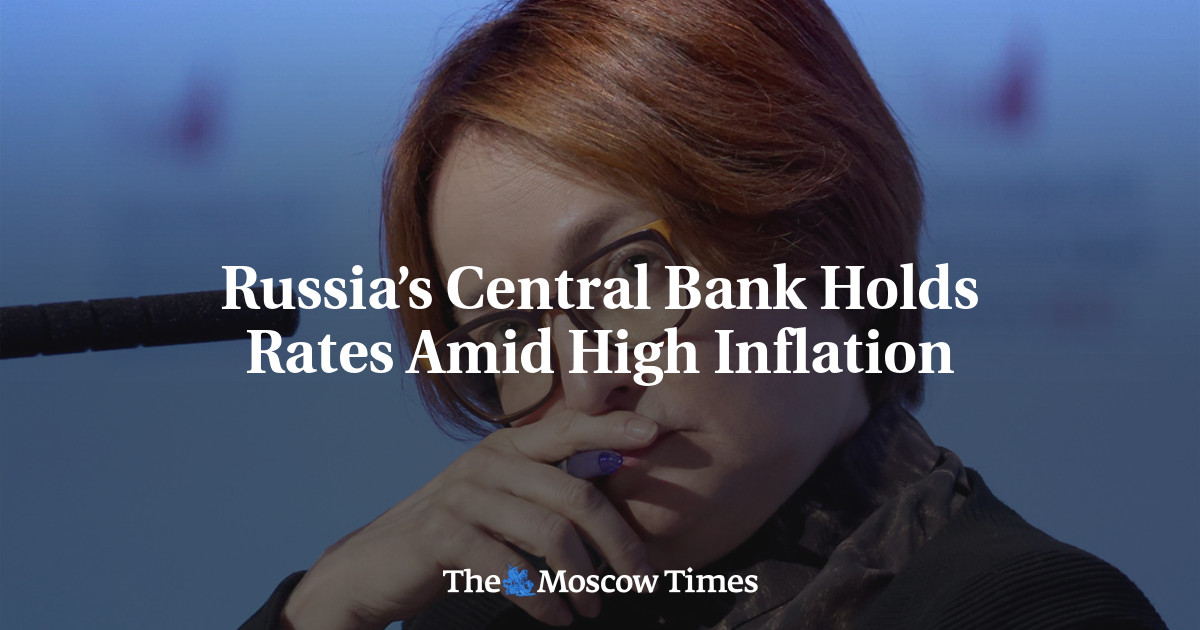
Switzerland ranks as the best nation for building wealth across generations, according to a new index by Henley & Partners, followed by the United States, Singapore, Australia, and Canada, while Greece ranked last out of the 15 nations evaluated.

TD Bank has received court approval for a $15.9 million settlement in a class-action lawsuit that focuses on whether the bank adequately disclosed its non-sufficient funds fee policy, after one plaintiff was charged $96 in fees for being 45 cents short on a PayPal bill.

Climate minister Graham Stuart faced ridicule during an episode of BBC Question Time as he dodged a question about the UK government's failure to grow the economy, with the audience erupting in laughter as he attempted to deflect the issue.

Pret a Manger has reduced the prices of its popular sandwiches in response to claims of profiteering, with some sandwiches seeing a decrease of up to £1.

Egypt's economic woes and rising living costs have led to an increase in digital nomads and illegal migration, with well-off young professionals flocking to the country's coastal towns while others seek a better life in Europe.

Investors should listen to earnings calls from companies to gain insight into the future direction of the economy, as businesses have a better understanding of turning points and on-the-ground conditions, according to Allianz Chief Economic Advisor Mohamed El-Erian.
Working class Americans are feeling the impact of inflation on their wallets, leading many to consider voting Republican in the upcoming presidential election.

Japan's economy has slipped to the fourth-largest in the world, experiencing recession indicators due to a weak yen and ongoing economic stagnation, alongside long-term challenges of an aging workforce and declining birth rate.

Despite the recent recession, the UK's retail sales experienced a surprising boost of 3.4% in January, indicating strong consumer spending and potentially signaling an end to the recession. However, experts caution that this increase may only be a temporary recovery rather than a sustained improvement.

The Managing Director of the IMF, Kristalina Georgieva, has congratulated Dr. Mohammed Amin Adam on his appointment as Ghana's Minister of Finance and Economic Planning, expressing the IMF's commitment to supporting his new role.
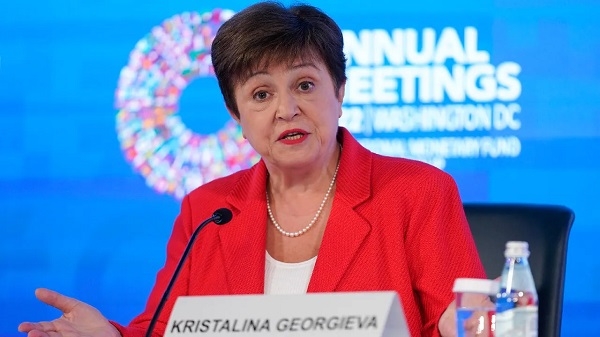
The US economy is unlikely to enter a recession this year due to factors such as robust consumer spending and stimulus money, but there's always a possibility of unforeseen economic shocks.

China's economy is in crisis as rapidly falling prices lead to a significant drop in consumer spending, causing chaos for Xi Jinping and potentially destroying the country's economy.

The UK entered a recession at the end of last year, which is defined as two consecutive quarters of economic shrinkage, and it could have implications for individuals.
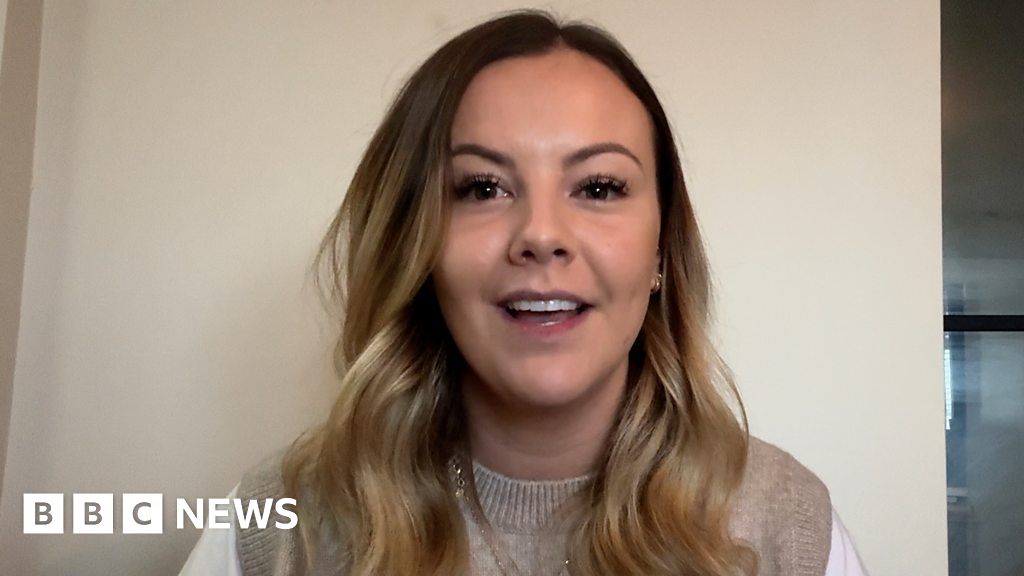
The Alliance on Surviving Covid-19 and Beyond (ASCAB) has urged President Bola Tinubu's government to reject pressure from the IMF to increase fuel and electricity prices, highlighting the IMF's different standards for Nigeria and advanced capitalist economies.
Shop sales in the UK rebounded in January, with a 3.4% increase following a record drop in December, as shoppers took advantage of food stockpiling and new year bargains, although inflation remains high.

Japan's stock market rallied despite weak economic data, with the Nikkei 225 index closing just below its historic peak reached in 1989, buoyed by a weak yen that makes Japanese shares cheaper for foreign investors.
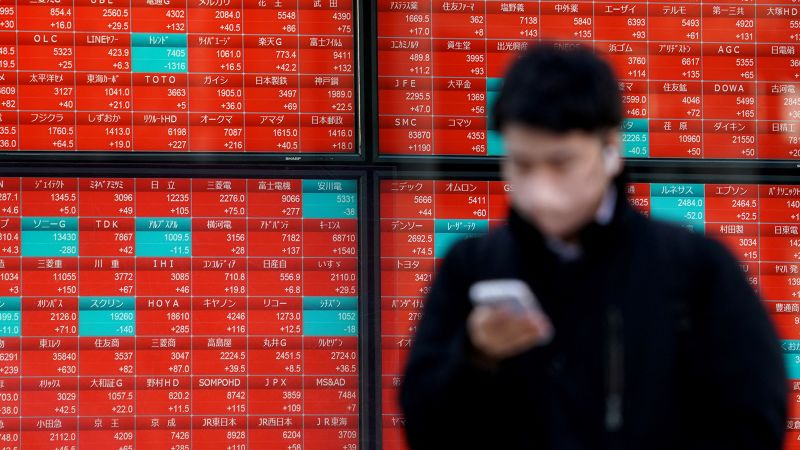
Despite the economic struggles of other major economies like Japan and the United Kingdom, the United States continues to experience growth, largely driven by robust household spending, government stimulus, and a solid job market, although risks such as inflation and heavy borrowing still loom.

The euro area's competitiveness crisis, driven by factors such as slow technology diffusion and regulatory barriers, requires increased competition, fostering integration, and raising public investment to boost productivity and promote economic growth.

